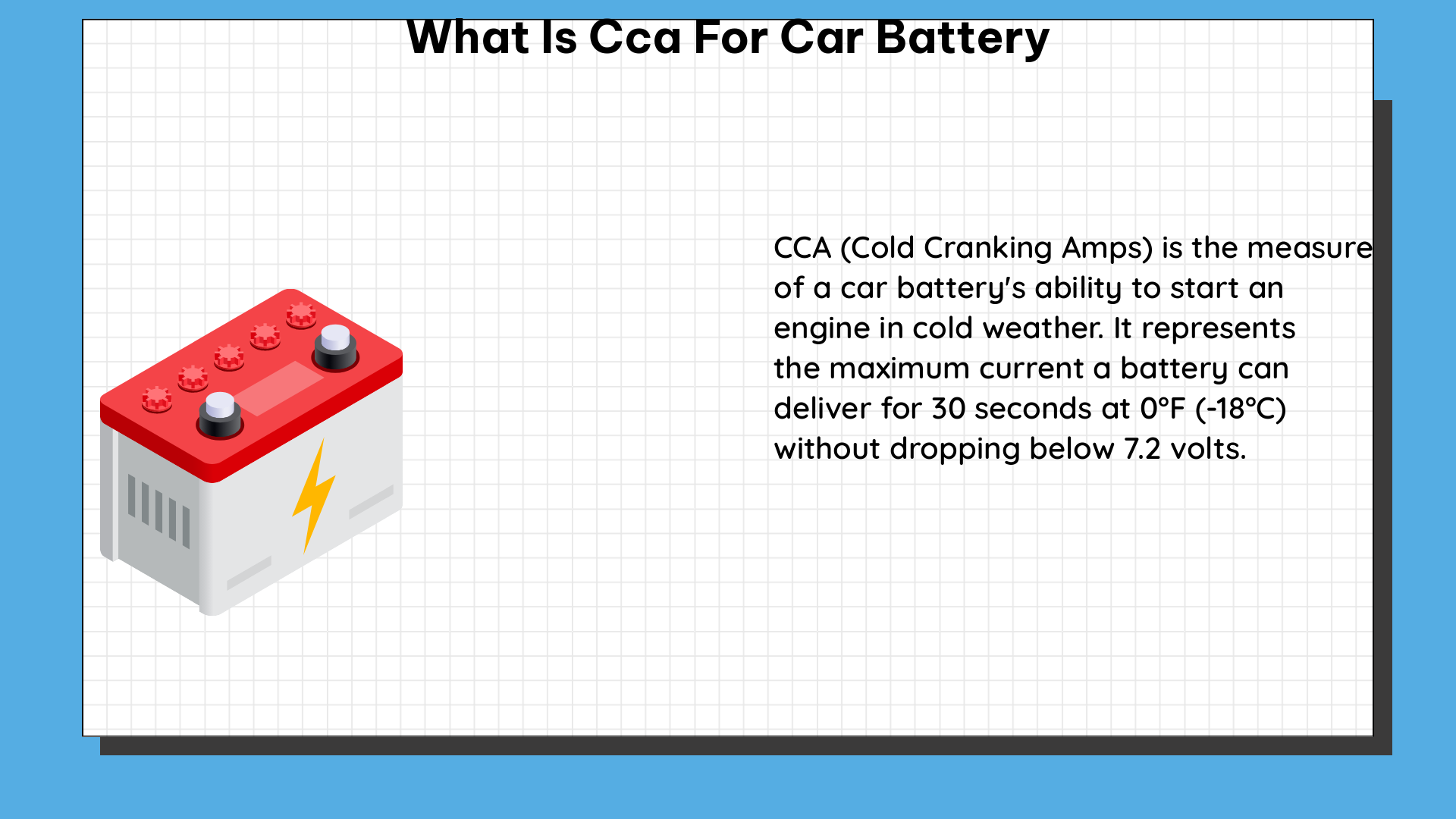Cold Cranking Amps (CCA) is a crucial metric that measures a car battery’s ability to start an engine in cold temperatures. This rating is essential for ensuring reliable starts, especially in regions with harsh winter conditions. Understanding the intricacies of CCA can help you make an informed decision when selecting the right battery for your vehicle.
The Science Behind CCA
CCA refers to the amount of amperage a battery can supply at 0 degrees Fahrenheit (-17.8 degrees Celsius) for 30 seconds while maintaining a voltage of at least 7.2 volts. This measurement is crucial because engine oil becomes thicker and chemical reactions within the battery slow down in cold weather, reducing its overall efficiency.
The CCA rating is determined by subjecting the battery to a controlled discharge test. During this test, a specific load is applied to the battery, and the current (in amperes) that the battery can sustain for 30 seconds at 0°F (-17.8°C) is measured. This value represents the CCA rating of the battery.
Factors Affecting CCA

Several factors contribute to a battery’s CCA rating, including:
-
Battery Size and Construction: Batteries with higher CCA ratings tend to be larger and heavier due to having more lead plates and electrolyte, which are necessary for delivering the required power.
-
Battery Chemistry: The type of battery chemistry, such as lead-acid or lithium-ion, can impact the CCA rating. Lead-acid batteries are the most common in automotive applications and generally have higher CCA ratings compared to other battery types.
-
Battery Age and Condition: As a battery ages, its CCA rating can decrease due to the gradual deterioration of the internal components. Regular maintenance and proper care can help maintain the battery’s CCA performance over time.
-
Temperature: The CCA rating is measured at 0°F (-17.8°C), but the actual performance of the battery can vary depending on the ambient temperature. Colder temperatures will result in a lower CCA, while warmer temperatures may slightly increase the CCA.
Importance of CCA in Cold Weather
The CCA rating is crucial for starting a vehicle in cold weather conditions. When the temperature drops, the engine oil becomes thicker, and the chemical reactions within the battery slow down, reducing its overall efficiency. A battery with a higher CCA rating can provide the necessary power to overcome these challenges and reliably start the engine.
Here’s a table that illustrates the relationship between temperature and CCA requirements:
| Temperature | CCA Requirement |
|---|---|
| 0°F (-17.8°C) | Highest CCA needed |
| 32°F (0°C) | Moderate CCA needed |
| 70°F (21.1°C) | Lowest CCA needed |
As the table shows, the colder the temperature, the higher the CCA rating required to ensure a successful engine start.
Selecting the Right CCA for Your Vehicle
When choosing a replacement battery for your vehicle, it’s essential to consider the CCA rating recommended by the manufacturer. This information can typically be found in your owner’s manual or on a sticker inside the engine bay.
It’s important to match or exceed the recommended CCA rating to ensure reliable starting performance, especially in cold weather. Selecting a battery with a higher CCA rating than the recommended value can provide additional starting power and a safety margin, but it’s generally not necessary to go significantly above the recommended rating.
Measuring and Testing CCA
CCA cannot be measured directly, but it can be estimated through various test methods. One common approach is to apply different discharge currents to the battery and observe which amperage keeps the battery above a set voltage while cold. Another method involves using specialized battery testers that can read the CCA by measuring the internal battery resistance.
These testing procedures can be time-consuming, often taking up to a week per battery, which is why they are not commonly performed by individual consumers. Instead, battery manufacturers and automotive service centers typically conduct these tests to determine the CCA ratings of their products.
Conclusion
CCA is a critical factor in assessing a car battery’s ability to start an engine in cold temperatures. Understanding the science behind CCA, the factors that influence it, and the importance of selecting the right CCA rating for your vehicle can help ensure reliable starts in adverse weather conditions. By choosing a battery with the appropriate CCA rating, you can enjoy a smooth and hassle-free driving experience, even in the harshest of winter climates.
Reference:
– Battery University – Cold Cranking Amps (CCA) Explained
– Automotive Battery Guide – Understanding CCA
– Car Talk – Choosing the Right Car Battery

The lambdageeks.com Core SME Team is a group of experienced subject matter experts from diverse scientific and technical fields including Physics, Chemistry, Technology,Electronics & Electrical Engineering, Automotive, Mechanical Engineering. Our team collaborates to create high-quality, well-researched articles on a wide range of science and technology topics for the lambdageeks.com website.
All Our Senior SME are having more than 7 Years of experience in the respective fields . They are either Working Industry Professionals or assocaited With different Universities. Refer Our Authors Page to get to know About our Core SMEs.